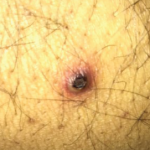NEW YORK (Reuters Health)—Inflammatory bowel disease (IBD) patients who achieve remission on treatment may want to go off their IBD medications. But half or more of those who do will have a relapse, according to comprehensive analysis of relevant research.
“Based on the studies with extended periods of follow up, relapse rates after cessation appear high across all therapeutic classes suggesting that complete discontinuation in the long-term may only be feasible in select patients,” the authors concluded.
“The decision to withdraw a drug should be made for each individual based on patient preference, disease markers, consequences of relapse, safety, and cost,” they wrote in Gastroenterology online Sept. 14.
“One of the most common questions confronted by clinicians is whether therapy with immunosuppressive drugs and biologics should be stopped or dose reduced once remission is achieved in IBD,” Dr. Ray Boyapati, of Western General Hospital in Edinburgh, UK, and Dr. Joana Torres, of the Icahn School of Medicine at Mount Sinai in New York City, who spearheaded the analysis, said in a joint email to Reuters Health.
“This is often considered due to concerns about long-term safety, side effects, costs and national regulations. This analysis was an attempt to review all the available evidence and provide clinicians with guidance on this important question,” they said.
Drs. Boyapati and Torres and their colleagues analyzed findings from 69 relevant studies involving a total of 4,672 patients with IBD. Eighteen studies focused on de-escalation (drug cessation or dose reduction) of immunomodulator monotherapy, eight focused on immunomodulator de-escalation from combination therapy, and 43 on de-escalation of anti-tumor necrosis factor (anti-TNF) agents.
“Stopping immunomodulator monotherapy after a period of remission was associated with high rates of relapse in patients with Crohn’s disease or ulcerative colitis (around 75% relapse by five years after therapy was stopped),” the research team reports.
“Most studies of patients with Crohn’s disease who discontinued the immunomodulator after combination therapy found that rates of relapse did not differ from those of patients who continued taking the drug (55%-60% had disease relapse 24 months after they stopped taking the immunomodulator),” they note. The single study looking at patients with ulcerative colitis favors continued immunomodulator therapy.
According to their analysis, only about half of patients who discontinue anti-TNF agents after combination therapy are still in remission 24 months later, but the proportion in remission drops with time.
“In the studies with long-term follow up, relapse rates after cessation appear high across all therapeutic classes,” Drs. Boyapati and Torres told Reuters Health.

